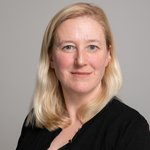Good communications skills are essential for all researchers, as research is disseminated through an increasingly wide range of channels, from informal to formal, from conference presentations to peer-reviewed journal articles. Knowing how to design a communications strategy for research is thus an important skill for graduate students to learn, and in this session, Professor Alan Kelly of University College Cork, Ireland (author of How Scientists Communicate: Dispatches from the Frontiers of Knowledge, 2019) will provide a brief overview of this area, and advice and tips for research students.
Arla Foods is a dairy cooperative owned by around 9000 dairy famers across seven countries (Denmark, Sweden, UK, Germany, Netherlands, Belgium and Luxembourg). Sustainability and climate is a top priority for Arla. In 2019 Arla launched it’s Green Ambition focusing on three areas: Better Climate, Clean Air and Water, and More Nature. Arla is also committed to Science Based Targets (SBT) and has set carbon reduction targets, aligned with 1.5 degrees pathway, which are approved by the SBT Initiative, and has also the goal to be carbon net zero in 2050. The largest share of the environmental impact occurs at farm level and to monitor the greenhouse gas emissions, Arla has developed a tool to calculate the carbon footprint of milk at farm level – the Climate Check tool. Over 90% of Arla’s owners have conducted a Climate Check, which also consist of a visit by an advisor to provide feedback to the farmer about the strength and weaknesses in order to help the farmer mitigate climate change.
PhD graduates are expected to contribute to organisational and societal impact beyond their core research expertise. This requires considerable development of a range of high-level transversal skills. The controversy workshop has been designed as an interactive, action learning space where you will explore cutting edge themes in the societal dimension that their science occupies. You will have the opportunity to participate in an interactive, collaborative workshop, looking at some of the key challenges in the Dairy sector. Working in small groups,you will develop transferrable skills of communication, negotiation, problem-solving and collaboration, while taking and arguing their stance on a controversial issue facing Dairy Science in the coming years.

A thorough understanding of research stakeholders is a vital first step to capture all relevant audiences and understand research outputs. After all, impact in modern research is so much more than scientific excellence, and researchers must move beyond creating new knowledge. Today, mission-driven research efforts are critical, and young researchers must prepare for a career that will have a meaningful societal, economic and innovative impact. This can be facilitated by developing a systematic approach to identifying, mapping, and characterising relevant stakeholders. Once characterised, researchers can design a personalised communication plan that includes outputs (the what?) and outcomes (the so what?) of their research.
The purpose is to develop a range of skills to support the career development of early career researchers in an interactive, collaborative environment.
At the end of the workshop, participants should understand how to map stakeholders, how to group similar stakeholders where appropriate, how to think critically about the requirements of each category of stakeholder, prepare a communication plan for their multiple audiences and show the relationship between their communication plan and potential outcomes (impact) for their research.
Aarhus University Conference Center
Frederik Nielsens Vej 4
8000 Aarhus